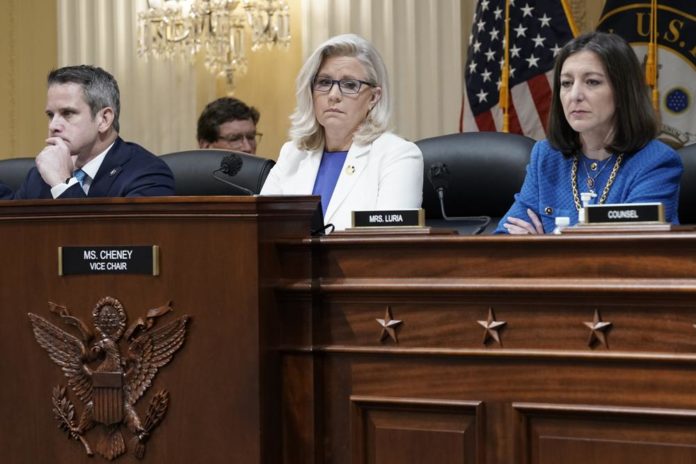
The House January 6 committee is closing out its set of summer hearings with its most detailed focus yet on the investigation’s main target: former President Donald Trump.
The panel is examining Trump’s actions on Jan. 6, 2021, as hundreds of his supporters broke into the U.S. Capitol, guiding viewers minute-by-minute through the deadly afternoon to show how long it took for the former president to call off the rioters. The panel is focusing on 187 minutes that day, between the end of Trump’s speech calling for supporters to march to the Capitol at 1:10 p.m. and a video he released at 4:17 p.m. telling the rioters they were “very special” but they had to go home.
Trump was “the only person in the world who could call off the mob,” but he refused to do so for several hours, said the committee’s chairman, Mississippi Rep. Bennie Thompson, who was participating in the hearing remotely due to a COVID-19 diagnosis. “He could not be moved.”
THE WHITE HOUSE DINING ROOM
The panel emphasized where Trump was as the violence unfolded — in a White House dining room, sitting at the head of the table, watching the violent breach of the Capitol on Fox News. He retreated to the dining room at 1:25 p.m., according to Rep. Elaine Luria, D-Va., one of two members who led the hearing. That was after some rioters had already breached barriers around the Capitol — and after Trump had been told about the violence within 15 minutes of returning to the White House.
Fox News was showing live shots of the rioters pushing past police, Luria said, showing excerpts of the coverage.
In video testimony played at the hearing, former White House aides talked about their frantic efforts to get the president to tell his supporters to turn around. Pat Cipollone, Trump’s top White House lawyer, told the panel that multiple aides — including Trump’s daughter, Ivanka Trump — advised the president to say something. “People need to be told” to leave, Cipollone recalled telling people, urging Trump to make a public announcement.
Trump “could not be moved,” Thompson said, “to rise from his dining room table and walk the few steps down the White House hallway into the press briefing room where cameras were anxiously and desperately waiting to carry his message to the armed and violent mob savagely beating and killing law enforcement officers.”
NO CALLS FOR HELP
As he sat in the White House, Trump made no efforts to call for increased law enforcement assistance at the Capitol, the committee said. Witnesses confirmed that Trump did not call the defense secretary, the homeland security secretary, or the attorney general.
The committee played audio of Gen. Mark Milley, chairman of the Joint Chiefs of Staff, reacting with surprise to the former president’s reaction to the attack. “You’re the commander-in-chief. You’ve got an assault going on on the Capitol of the United States of America. And there’s Nothing? No call? Nothing Zero?” Milley said.
As Trump declined to call for help, Vice President Mike Pence was hiding in the Capitol, just feet away from rioters who were about to breach the Senate chamber. The committee played audio from an unidentified White House security official who said Pence’s Secret Service agents “started to fear for their own lives” at the Capitol and called family members in case they didn’t survive.
Shortly afterward, at 2:24 p.m., Trump tweeted that Pence didn’t have the “courage” to block or delay the election results as Congress was certifying Joe Biden’s presidential victory.
FORMER WHITE HOUSE AIDES
Matt Pottinger, who was Trump’s deputy national security adviser at the time, and Sarah Matthews, then the deputy press secretary, testified at the hearing. Both resigned from their White House jobs immediately after the insurrection.
Both Pottinger and Matthews told the committee of their disgust at Trump’s tweet about Pence.
Pottinger said he was “disturbed and worried to see that the president was attacking Vice President Pence for doing his constitutional duty,” which he said was “the opposite of what we needed at that moment.”
“That was the moment I decided I was going to resign,” Pottinger said.
Matthews said the tweet was “essentially him giving the green light to those people,” and said Trump’s supporters “truly latch on to every word and every tweet.”
‘WE HAVE CONSIDERABLY MORE TO DO’
At the beginning of the hearing, Thompson and Wyoming Rep. Liz Cheney, the committee’s Republican vice chair, announced that the panel would “reconvene” in September to continue laying out their findings.
“Doors have opened, new subpoenas have been issued, and the dam has begun to break,” Cheney said of the committee’s probe. “We have considerably more to do. We have far more evidence to share with the American people and more to gather.”
Republished with the permission of The Associated Press.













